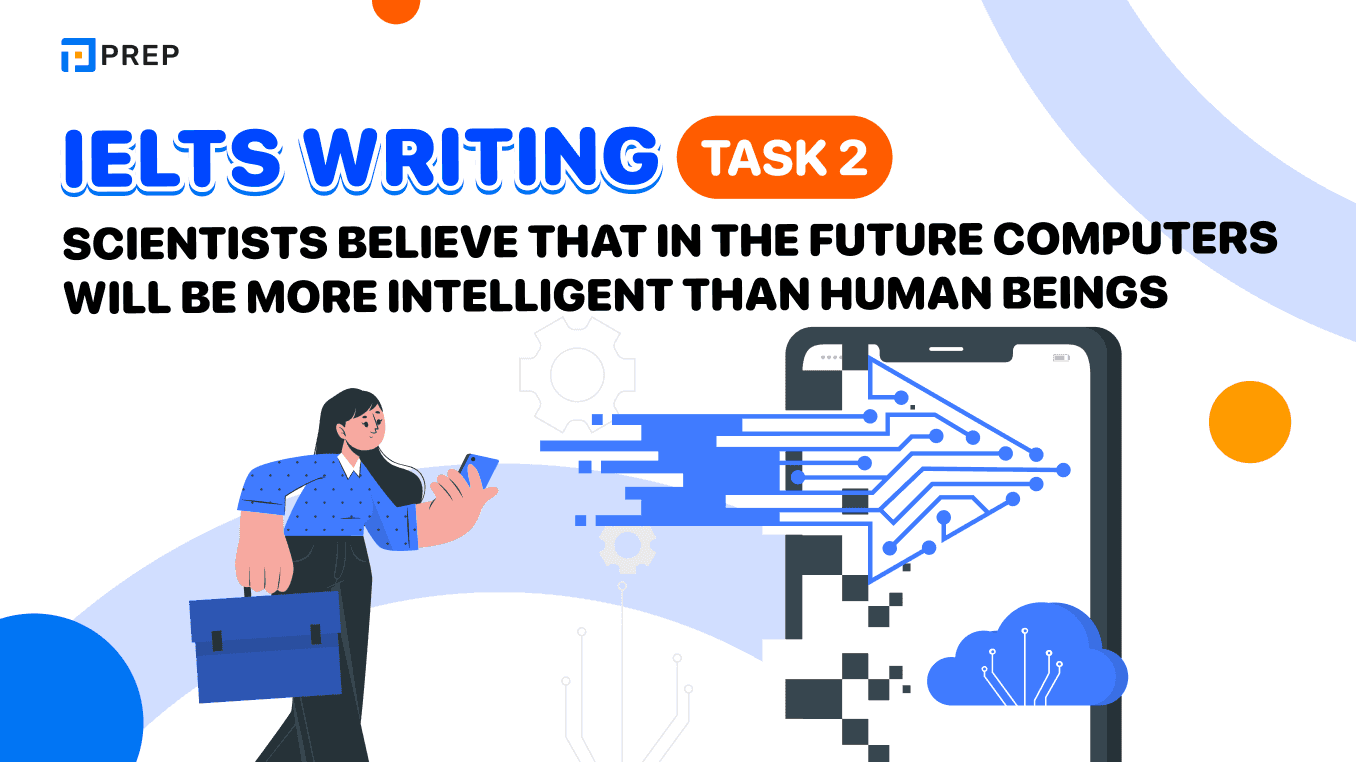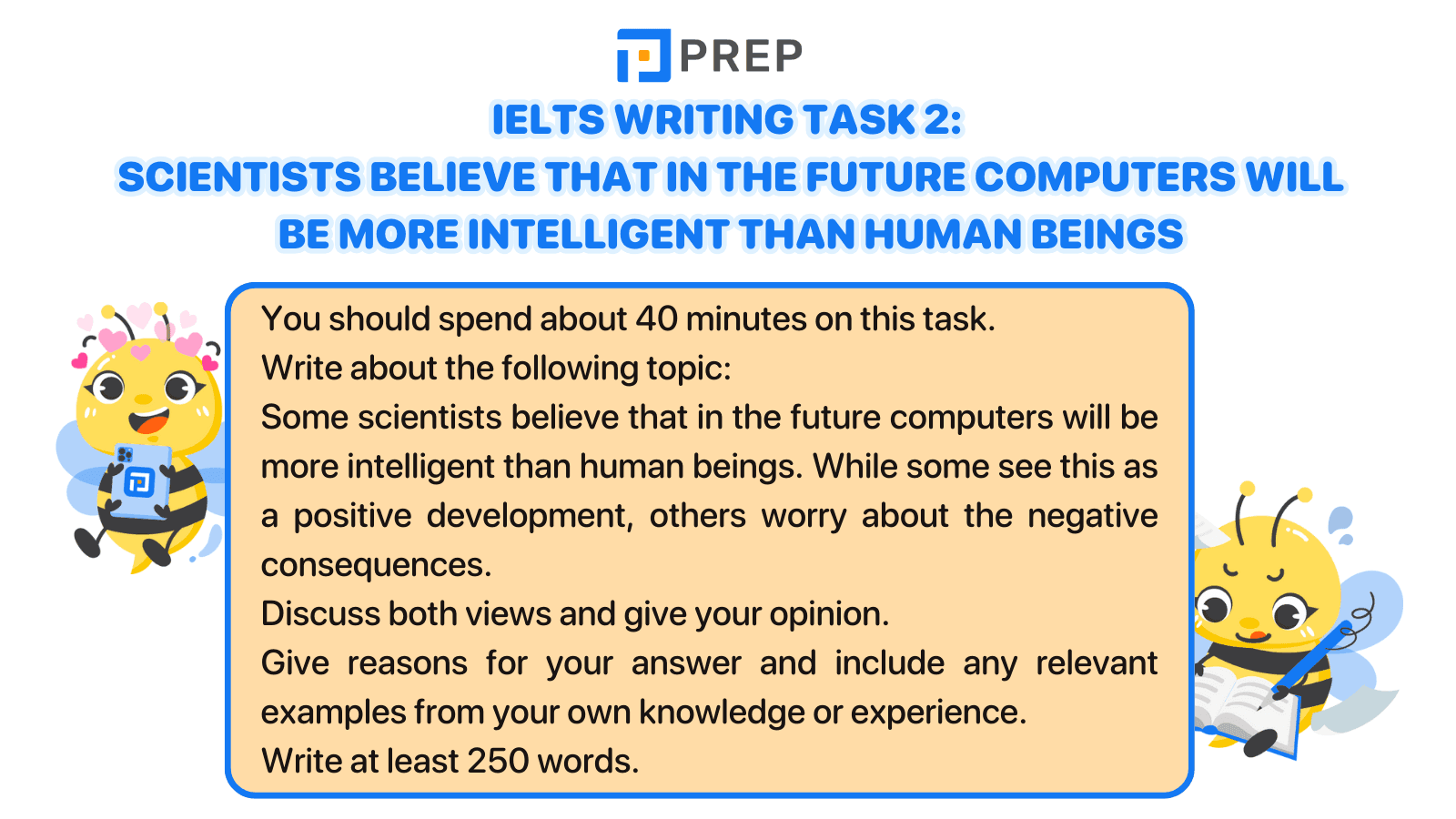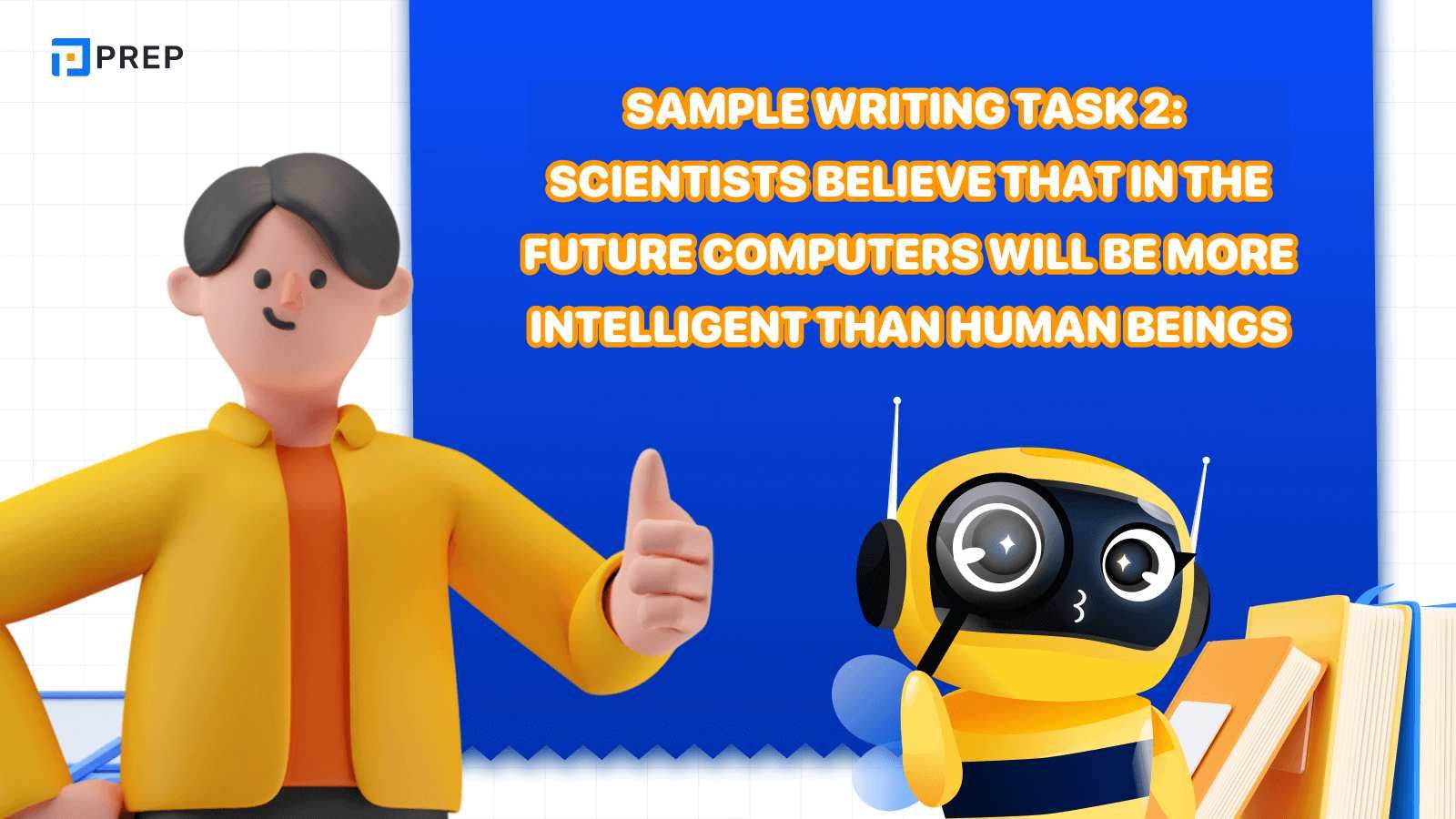Sample IELTS Writing Task 2 Scientists believe that in the future computers will be more intelligent than human beings
IELTS Writing Task 2 Scientists believe that in the future computers will be more intelligent than human beings is part of the list of realistic IELTS Writing prompts. In this article, let's explore the full prompt, a detailed outline, and a high-quality sample essay together with PREP!
*This sample was prepared by Mr. Nhat Pham, an IELTS 8.5 Overall achiever (9.0 Listening, 9.0 Reading, 8.0 Writing, 7.5 Speaking) and Marker Leader at PREP.

I. Task and outline for IELTS Writing Task 2 Scientists believe that in the future computers will be more intelligent than human beings
1. Task
You should spend about 40 minutes on this task.
Write about the following topic:
Some scientists believe that in the future computers will be more intelligent than human beings. While some see this as a positive development, others worry about the negative consequences.
Discuss both views and give your opinion.
Give reasons for your answer and include any relevant examples from your own knowledge or experience.
Write at least 250 words.

2. Outline for IELTS Writing Task 2
Please take a quick look at the below outline for IELTS Writing Task 2!
|
Introduction |
|
|
Why computers which are more intelligent than human beings are beneficial |
|
|
Why computers which are more intelligent than human beings are harmful |
|
|
Conclusion & Opinion |
|
II. Sample IELTS Writing Task 2 Scientists believe that in the future computers will be more intelligent than human beings

Let's explore the sample essay for IELTS Writing Task 2 Scientists believe that in the future computers will be more intelligent than human beings with a band score of 7+ that was written by teacher Minh Nhat - an experienced IELTS essay grader from PREP, shall we?
Recently, the capabilities of computers have sparked a debate between its supporters and skeptics alike. While some observers regard the possibility of machines surpassing human intellect as a beneficial development, I am inclined to side with critics who claim that this situation will result in dire consequences.
Certainly, it is reasonable to assume that hyper-intelligent computers will positively affect human life. These devices, first and foremost, can dramatically improve the speed and precision of problem-solving. Advanced machine learning algorithms are capable of analyzing data and dissecting complex issues at a staggering pace, providing the potential to revolutionize fields from quantum physics to medicine. This, as a result, would lead to improved quality of human life. Such computers, furthermore, can work continuously and consistently, but without human limitations such as fatigue and emotion-driven errors. If these machines are utilized in public services, for instance, people would be pleased with receiving responses quickly and not having to wait for officials to process their requests.
Machines which can surpass human intellect possess the potential to do harm, however. Their existence may lead to large-scale unemployment, due to outpacing human employees’ efficiency. This has already happened in certain professions, such as journalism, where droves of workers were laid off as their executives sought to replace them with artificial intelligence writers. More astute observers, in addition, would find that computers’ freedom from emotion-driven errors may become a threat to humanity. Once intelligent machines attain a certain level of autonomy, in their cold logic, they might conclude that human beings are a flawed and destructive species which deserves extinction. This scenario is not entirely based on science fiction, seeing how far mankind has recently progressed in terms of artificial intelligence development.
In conclusion, while hyper-intelligent computers can align with human aspirations to innovate and maximize efficiency, being aware of the threats they may pose is more crucial. It is therefore necessary to keep the machines’ capability in check to ensure that computers are used in the service of humanity.
Vocabulary commonly used in the sample essay for IELTS Writing Task 2 Scientists believe that in the future computers will be more intelligent than human beings:
-
Spark sth (v.): to ignite, to provoke
-
Skeptic (n.): a person inclined to doubt or question accepted opinions
-
Observer (n.): a person who observes
-
Dire (adj.): extremely serious or urgent
-
Hyper-intelligent (adj.): extremely intelligent
-
Algorithm (n.): a step-by-step procedure for solving a problem
-
Dissect sth (v.): to analyze in minute detail
-
Staggering (adj.): extremely surprising or impressive
-
Quantum physics (n.): the branch of physics dealing with the behavior of matter and energy on the molecular, atomic, nuclear, and even smaller microscopic levels
-
Fatigue (n.): a feeling of tiredness and lack of energy
-
Surpass sth (v.): to exceed; to be better than
-
Outpace sth (v.): to move or progress faster than
-
Laid off (adj.): dismissed temporarily or permanently from a job
-
Astute (adj.): having or showing an ability to accurately assess situations or people and turn this to one's advantage
-
Autonomy (n.): the right or condition of self-government
-
Flawed (adj.): having a fault or imperfection
-
Destructive (adj.): causing great damage or harm
-
Aspiration (n.): a hope or ambition of achieving something
-
Keep sth in check (v.): to control or restrain something
In this article, PREP has shared the detailed prompt, outline, and a high-quality sample IELTS Writing Task 2 Scientists believe that in the future computers will be more intelligent than human beings. Keep following PREP to get updates on more IELTS Writing Task 2 real-life prompts!
PREP is the only platform offering a comprehensive Writing evaluation process powered by AI technology. The system automatically detects and corrects errors in vocabulary and grammar while identifying critical mistakes that could lower your exam score. Using an exclusive scoring system with 4 main criteria and 11 sub-criteria, it helps you pinpoint common errors, analyze them, and provides detailed solutions in an easy-to-follow interface.
In addition to identifying mistakes, the system highlights your strengths in vocabulary, grammar structures, and ideas, helping you enhance these in future exams. It also offers tailored suggestions to address weaker areas, allowing you to improve step by step and effectively boost your band score.
Download the PREP app now to study IELTS at home and experience a high-quality online preparation program designed to help you achieve your target scores.

Hi I'm Chloe, and I am currently serving as an Product Content Administrator at Prep Education. With over five years of experience in independent online IELTS study and exam preparation, I am confident in my ability to support learners in achieving their highest possible scores.
Comment
Premium content
View allPersonalized roadmap
Most read












